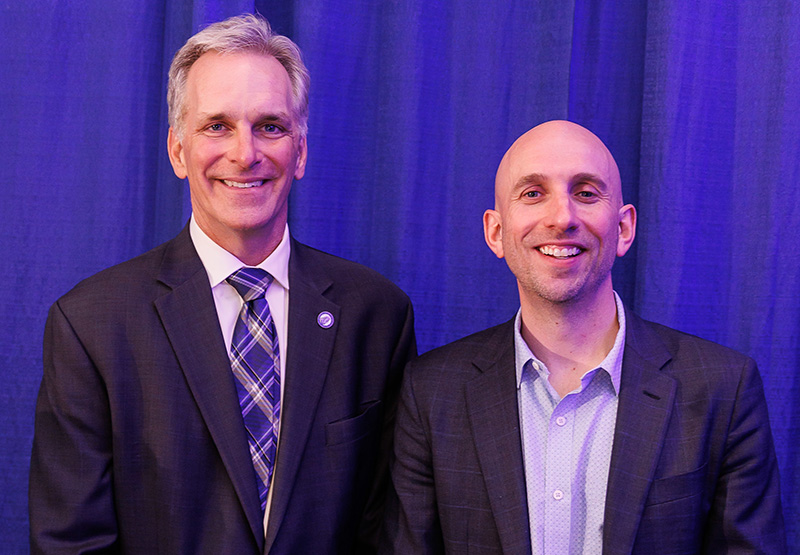
President Grigsby with J. William Reynolds ’03, Mayor of the City of Bethlehem, who accepted the Shining Lights Award for the partnership between Moravian University and the City of Bethlehem’s Department of Community and Economic Development, which benefitted Bethlehem and Moravian University students
The Graduate Business Program in Moravian’s School of Business and Economics and the City of Bethlehem’s Department of Community and Economic Development (DCED) have had a strategic partnership since 2012. Together, the business program and DCED have provided more than 100 students with productive, real-world field experience and set up dozens of the city’s new businesses for success.
According to its website, Bethlehem’s DCED is responsible for operating various bureaus that impact the city’s quality of life and building conditions, ranging from housing inspections and code enforcement to planning, zoning, and recycling. It’s also responsible for community and economic development, which involves providing space and funding for innovative, new startup companies.
Eight years ago, Economic Development Coordinator Asher Schiavone first approached Professor of Business Lizabeth Kay Kleintop looking for graduate students to help new businesses in the city. The students would serve as business consultants, allowing them to practice the knowledge and skills they were learning in their classes. Since then, the program has flourished. To date, approximately 150 students in the course Management 571: Leading Change in Organizations have successfully counseled 43 different businesses and organizations.
“This partnership has allowed students to move from theory to application by addressing challenging, complex problems with the knowledge and skills they learned in their graduate programs while being part of Bethlehem’s work of nurturing innovation and entrepreneurship to grow new businesses and create jobs in the city,” says Kleintop. “Mr. Schiavone and the DCED have been instrumental, and continue to be so, in providing students hands-on opportunities to practice their knowledge and skills.”
Of those 43 businesses helped, 30 were start-ups that were part of the Keystone Innovation Zone (KIZ) business development initiative administered by the city. According to Pennsylvania’s DCED website, the KIZ program was established in 2004 as a component of the Rendell Administration’s Economic Stimulus Plan to address the lack of entrepreneurial activity and economic growth around Pennsylvania’s research and development clusters. A KIZ was established in Bethlehem and utilized local institutions of higher education as economic drivers.
The advantages of this strategic program are two-fold. Students in the master’s in business administration, human resource management, and healthcare administration programs all experience practical field exercises that enhance their educational opportunities. Meanwhile, the university’s engagement in the community is extended by supporting the city’s economic development.
“We have further prioritized ‘homegrown economic development’ through supporting entrepreneurs developed by our local educational institutions,” says J. William Reynolds ’03, Mayor of the City of Bethlehem. “There are numerous examples of student-founded companies that now are contributing to Bethlehem’s economy, and Moravian has certainly played a role in their growth and success.”